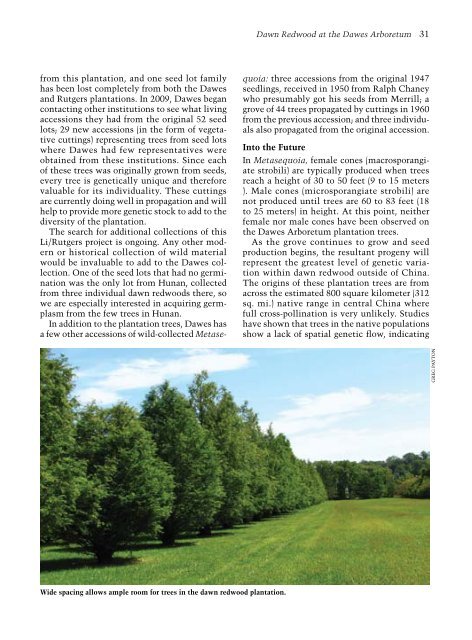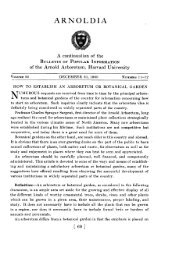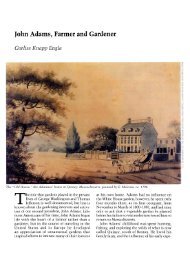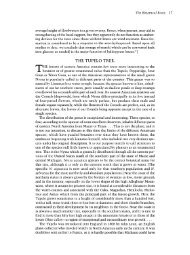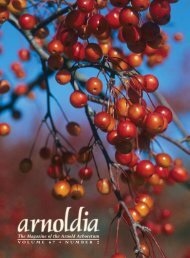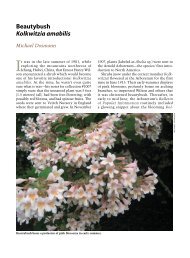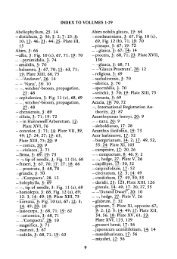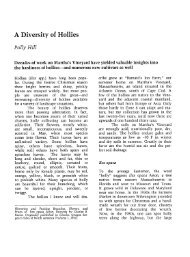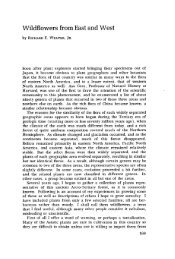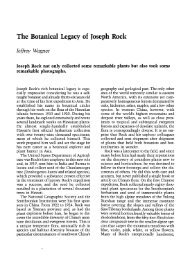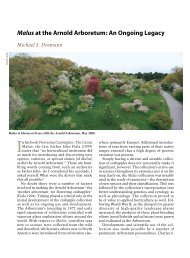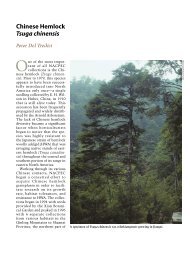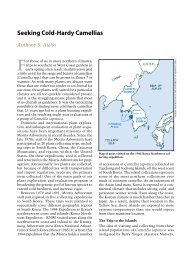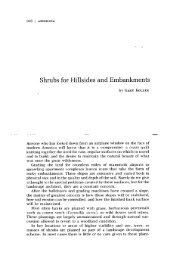The Magazine of the Arnold Arboretum - Arnoldia - Harvard University
The Magazine of the Arnold Arboretum - Arnoldia - Harvard University
The Magazine of the Arnold Arboretum - Arnoldia - Harvard University
Create successful ePaper yourself
Turn your PDF publications into a flip-book with our unique Google optimized e-Paper software.
Dawn Redwood at <strong>the</strong> Dawes <strong>Arboretum</strong> 31<br />
from this plantation, and one seed lot family<br />
has been lost completely from both <strong>the</strong> Dawes<br />
and Rutgers plantations. In 2009, Dawes began<br />
contacting o<strong>the</strong>r institutions to see what living<br />
accessions <strong>the</strong>y had from <strong>the</strong> original 52 seed<br />
lots; 29 new accessions (in <strong>the</strong> form <strong>of</strong> vegetative<br />
cuttings) representing trees from seed lots<br />
where Dawes had few representatives were<br />
obtained from <strong>the</strong>se institutions. Since each<br />
<strong>of</strong> <strong>the</strong>se trees was originally grown from seeds,<br />
every tree is genetically unique and <strong>the</strong>refore<br />
valuable for its individuality. <strong>The</strong>se cuttings<br />
are currently doing well in propagation and will<br />
help to provide more genetic stock to add to <strong>the</strong><br />
diversity <strong>of</strong> <strong>the</strong> plantation.<br />
<strong>The</strong> search for additional collections <strong>of</strong> this<br />
Li/Rutgers project is ongoing. Any o<strong>the</strong>r modern<br />
or historical collection <strong>of</strong> wild material<br />
would be invaluable to add to <strong>the</strong> Dawes collection.<br />
One <strong>of</strong> <strong>the</strong> seed lots that had no germination<br />
was <strong>the</strong> only lot from Hunan, collected<br />
from three individual dawn redwoods <strong>the</strong>re, so<br />
we are especially interested in acquiring germplasm<br />
from <strong>the</strong> few trees in Hunan.<br />
In addition to <strong>the</strong> plantation trees, Dawes has<br />
a few o<strong>the</strong>r accessions <strong>of</strong> wild-collected Metasequoia:<br />
three accessions from <strong>the</strong> original 1947<br />
seedlings, received in 1950 from Ralph Chaney<br />
who presumably got his seeds from Merrill; a<br />
grove <strong>of</strong> 44 trees propagated by cuttings in 1960<br />
from <strong>the</strong> previous accession; and three individuals<br />
also propagated from <strong>the</strong> original accession.<br />
Into <strong>the</strong> Future<br />
In Metasequoia, female cones (macrosporangiate<br />
strobili) are typically produced when trees<br />
reach a height <strong>of</strong> 30 to 50 feet (9 to 15 meters<br />
). Male cones (microsporangiate strobili) are<br />
not produced until trees are 60 to 83 feet (18<br />
to 25 meters) in height. At this point, nei<strong>the</strong>r<br />
female nor male cones have been observed on<br />
<strong>the</strong> Dawes <strong>Arboretum</strong> plantation trees.<br />
As <strong>the</strong> grove continues to grow and seed<br />
production begins, <strong>the</strong> resultant progeny will<br />
represent <strong>the</strong> greatest level <strong>of</strong> genetic variation<br />
within dawn redwood outside <strong>of</strong> China.<br />
<strong>The</strong> origins <strong>of</strong> <strong>the</strong>se plantation trees are from<br />
across <strong>the</strong> estimated 800 square kilometer (312<br />
sq. mi.) native range in central China where<br />
full cross-pollination is very unlikely. Studies<br />
have shown that trees in <strong>the</strong> native populations<br />
show a lack <strong>of</strong> spatial genetic flow, indicating<br />
Greg PAYTON<br />
Wide spacing allows ample room for trees in <strong>the</strong> dawn redwood plantation.


